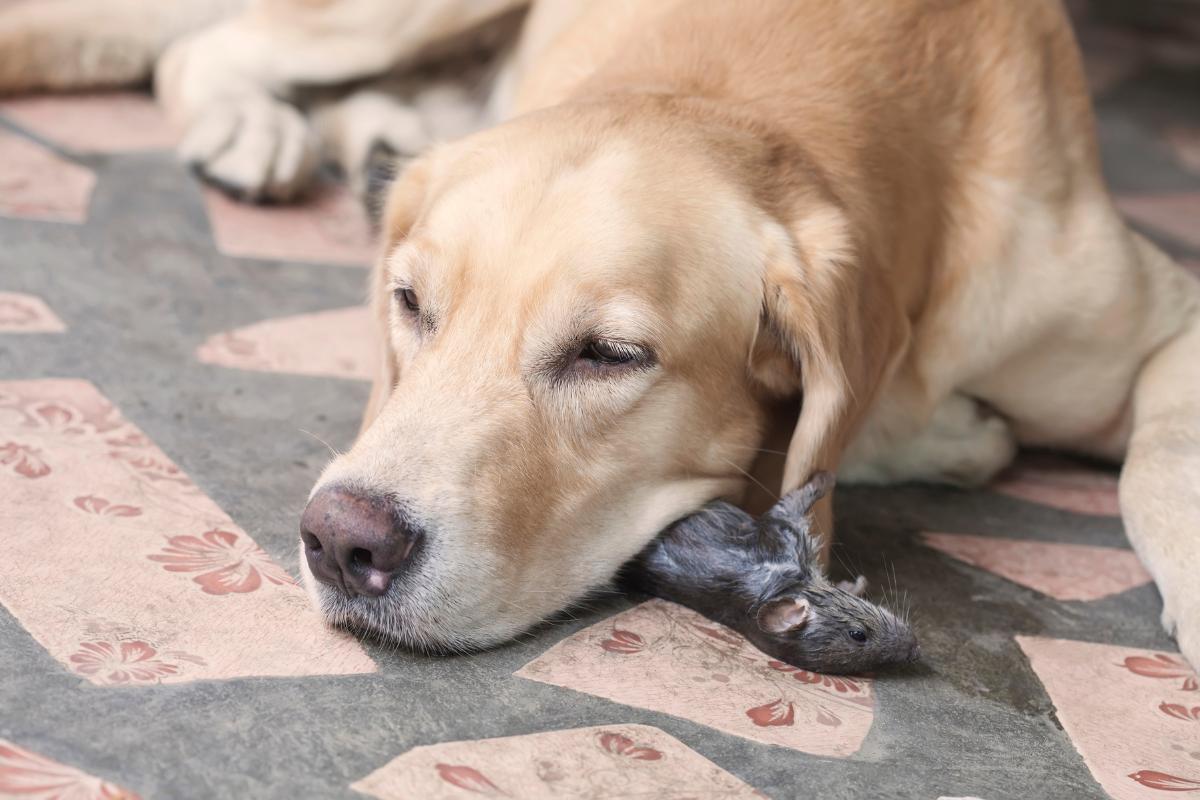My Dog Killed a Rat - Should I Be Worried?



See files for Dogs
If we see our dog has bit a rat, we will likely think about the reputation of these rodents. Although any wild animal can be a vector, rats are particularly associated with the spread of disease. This is partly due to their history, but it is largely a result of their nature. Rats live in close proximity to humans and their pets. Whether out walking, in the garden or even inside the home, it is possible for a dog to come in contact with a rat. Since rats would be prey for wild dogs, it is not unusual for a dog to bite, kill or even eat a rat. Doing so makes us wonder what might happen to the dog if this happens.
At AnimalWised, we ask should I be worried if my dog killed a rat? We discover whether the dog will be infected by disease or what other concerns we might have.
Why did my dog kill a rat?
Through domestication, we have managed to restrict their predatory behaviors. This is thanks to the socialization of individual dogs, as well as the training and education we provide as part of their care. Domestication has also made them genetically predisposed to living as companions to humans. As much as we can influence their behavior, we cannot completely remove their innate instinct.
Before they became so popular as companions, dogs were more commonly trained as working animals. This included work on farms and country estates, often specifically for hunting activities. This hunting is not only for sport, but also practical assistance in keeping property free from vermin. Different breeds had different abilities. For example, Border Collies were used as a type of herding dog breed, whereas Labradors were bred as retrievers.
Hunting dog breeds are those which have the most developed hunting instinct because it has been bred into them. This includes those which have been specifically bred to catch rats, known as ratters. Selective breeding has meant that individual dogs which are particularly good or prone to catching rats were chosen as the ones to sire pups. This repeats generation after generation to result in dogs which are naturally inclined to kill a rat.
There are still farmers and other people who want to continue using dogs as hunting or ratter dogs. However, since the popularity of these dogs as companion animals, dog guardians have to be very careful. If they want to keep them in the home, they will need to educate them to use these behaviors in a safe way or to reduce them altogether. One of the most important cases is when we have small children in the home.
In summary, we point out that it is normal for a dog to chase a rat, corner it and sometimes even kill it. They see the animal as prey. Also, hunting prey positively reinforces behavior, which may imply a greater desire to hunt.
Types of ratter dogs
As we stated above, although all dogs have some sort of hunting instinct, certain breeds have been bred for this very purpose. This makes their ratting instinct not only acute, but something we need to be very careful of. For example, some cats are not much larger than a big rat, so ensuring the ratter dog doesn't think they are prey is essential if they are to live together.
Some ratter dog breeds actually have the word ratter or rat in their name. Many of these are terrier breeds which are small enough to chase some rats down certain holes or burrows. You will see that generally, ratter dogs are smaller breeds. Types of ratter dogs include:
- Prague Ratter
- Dutch Ratter
- German Pinscher
- Affenpinscher
- Andalusian Ratter
- Murcian Ratter
- Valencian Terrier
- Basque Ratter
- American Hairless Terrier
- Teddy Roosevelt Terrier
- Manchester Terrier
- Rat Terrier
- Jack Russell Terrier
- Miniature Pinscher
As you can see, some of these breeds are very specific and not very common outside of their homeland. Quite a few breeds are specific to Spain, for example. However, breeds like the Jack Russell Terrier and Mini Pin are more common, with not many knowing they were originally bred as ratter dogs.
Can a dog and a rat live in the same home?
It is perfectly possible for a dog and a rat to live in the same home and even become friends. However, this will depend on socialization, training and experience. For a dog and a rat to get along, the dog will need to be socialized from a young age and taught not to attack the rodent. This is more difficult with ratter dog breeds because it takes greater effort to negate their natural instinct. Not all dogs will be able to befriend a pet rat, but this will depend on the individual.
Should I be worried if my dog killed a rat?
The first question we want to know is whether or not the dog has transmitted a disease. Rats carry a wide range of diseases, not all of which can affect dogs. According to the Centers for Disease Control and Prevention (CDC), the following diseases are carried by rats[1]:
- Hantavirus Pulmonary Syndrome
- Hemorrhagic Fever with Renal Syndrome
- Lassa Fever
- Leptospirosis
- Lymphocytic Chorio-meningitis (LCM)
- Omsk Hemorrhagic Fever
- Plague
- Rat-Bite Fever
- Salmonellosis
Since rats can transmit disease through blood, if a dog kills a rat, it is possible the contamination can occur through the dog biting the rat. You may have seen that your dog killed a rat, but did not eat it. Even simply having the rat in their mouth can pass on bacteria if it is on their fur.
We also need to be careful about bacteria or other pathogens from the rat moving to the dog's mouth. Even if the dog does not contract a disease, spreading bacteria via their mouth or even parasites contracted from the rat can mean that it is possible humans can contract them.
While this may sound scary, it is important to remember a lot of factors need to occur for the disease to transfer to the dog or any humans. Just because rats can be a vector of disease, does not mean they will be. This is even less likely if the dog has been properly vaccinated and dewormed.
Some guardians are particularly scared about deadly diseases in dogs such as rabies. Fortunately, there are very few cases of small rodents such as the rat being infected with rabies and no known cases where they have spread the disease to dogs.
Regardless, we should take the dog to the veterinarian if they have killed a rat. This will rule out any problems and provide early treatment in the unlikely case there is a problem.

Stopping ratting behavior in dogs
The prey drive in dogs is influenced by many factors and some will have little to begin with. Most will like to play and chase objects, but some will need to have their prey drive reigned in, even ratter dogs.
The first thing we can do is preventive. When we are out with our dog which is likely to chase potential prey, always keep them on a leash. This will need to stay in place until the dog learns how to control their behavior. Some dogs may never learn to properly control it and will run the risk of injuring themselves if they run off quickly. A muzzle may also be put in place to prevent harm.
Education is the most important factor in stopping ratting behavior. This does not mean scolding. Since the prey drive is a natural instinct in dogs, shouting at them for doing what comes instinctively will only confuse them and can lead to problem behavior. Instead, we will need to train them to not react when small animals are in sight. We can start by providing stuffed toys and work our away up, but always ensure we are not putting any other animals in danger.
Once we have trained them, we will need to carry out a test. This is performed by trained ethologists and trainers. it is similar to a test Greyhounds need to take to ensure they don't chase after small animals. Speak to your veterinarian about arranging this test. As we have said, with good socialization, it is even possible the dog will become friends with small animals, but we always need to be careful.
Training your dog begins as soon as they enter your family, so this video on how to train a puppy will help you to get started:

If you want to read similar articles to My Dog Killed a Rat - Should I Be Worried?, we recommend you visit our Facts about the animal kingdom category.
1. National Park Services. (n.d.). Rodent-born diseases.
https://www.nps.gov/articles/000/rodent-borne-diseases.htm






